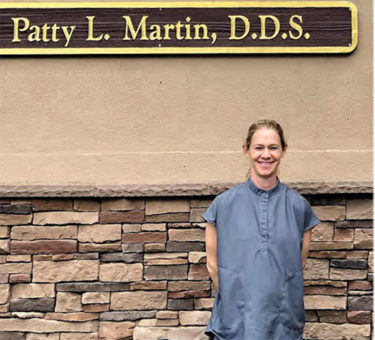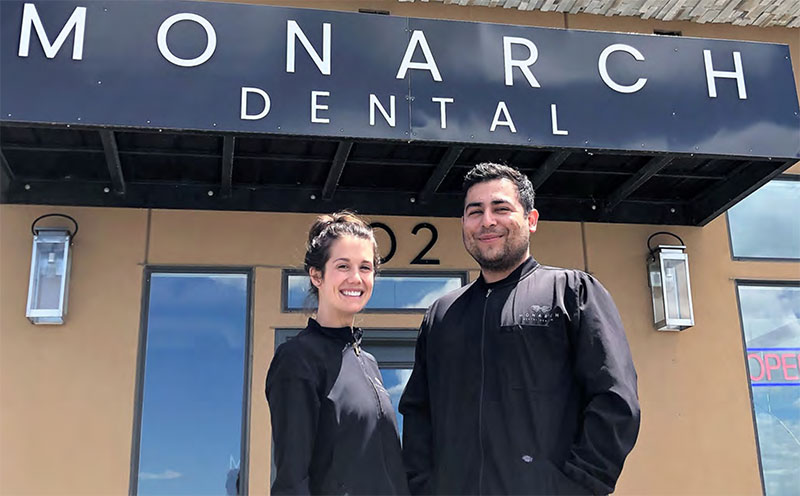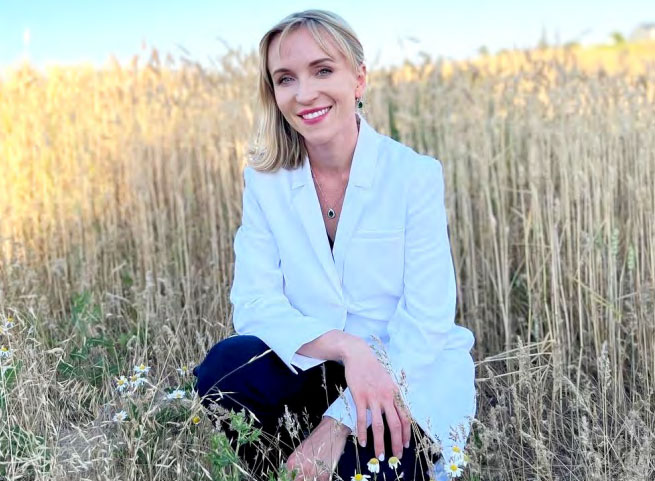Consider a house in Touchet
Touchet is a quaint town in southeastern Washington. It nestles among the rolling hills of the Palouse that provide an endless backyard of lush greenery. At night the dome of stars glistens above while a gentle breeze brushes the plains, and it costs a fraction of the price of a similar property in Seattle. Yet life in this little slice of paradise can still present challenges.
Touchet’s population is just shy of 400. The nearest grocery store is 20 miles away in Walla Walla, which isn’t much of a problem. But so is the nearest hospital, the nearest surgeon, and the nearest dental provider. Not only is this the case for the people of Touchet, but for all of the small towns within 20 miles of Walla Walla.
The demand for dentists in Washington’s rural communities is never lacking, which is why our School of Dentistry gives a select cohort of students the tools to practice proficiently in the outlying areas that need them the most.
RIDE, our Regional Initiatives in Dental Education program, was established in 2008 to train dentists in the specific skills needed to practice in Washington’s rural and underserved areas. Rural communities have long struggled with access to care; a lack of local providers often forces residents to drive substantial distances to reach clinics. For example, dentist-to population ratios range from one dentist per 948 people in King County to one per 12,300 people in Pend Oreille County along the Washington-Idaho border.
How RIDE works
RIDE’s template was the UW School of Medicine’s 51-year-old WWAMI (Washington, Wyoming, Alaska, Montana, Idaho) regional education program. WWAMI recruits students from each of the five states to graduate with the intent to return them to their communities as medical providers.
Upon acceptance to the UW, eight dental students are selected to form their class’s RIDE cohort. “We want students that are self-starters, mature, able to handle things by themselves but that can also work in a bigger community,” says Dr. Frank Roberts, RIDE Program Director, who is also Associate Dean for Regional Affairs and Chair of the Department of Periodontics. Like the WWAMI program, the RIDE admissions team often selects students who come from the rural communities of interest since they’re more likely to want to return to those communities.
After an orientation and early clinical immersion experience in Seattle where they meet the rest of their class, RIDE students spend their first year at the Eastern Washington University (EWU) Riverpoint Campus in Spokane. There they take the same dental classes as their Seattle campus counterparts, in person and also using remote learning technologies. They also take general anatomy classes alongside EWU dental hygiene and UW WWAMI medical students, creating an early interdisciplinary connection.

In the summer after their first year, they go on a four-week Rural/Underserved Opportunities Program (RUOP) rotation where they serve as expanded-function dental assistants at one of multiple community health clinics across the state. Those sites include clinics in Othello, Moses Lake, Okanogan, Colville, Lake Spokane, Spokane, Yakima, Chelan, and Wenatchee, along with satellite clinics of those sites in Oroville, Brewster, Bridgeport, Twisp, Mattawa, Connell, Springdale, Quincy, and Ephrata.
After spending their second, third, and the beginning of their fourth years back in Seattle with the rest of their class, the RIDE students return to the communities where they served their RUOP rotations for an extended five-month clinical rotation before graduating. This time, they go back not as assistants but as fully fledged dental practitioners.
“I would argue that [RIDE students] probably are more prepared to go out right after graduating,” says Dr. Art DiMarco, the EWU RIDE Director, who is both a RIDE dental and EWU dental hygiene professor. “They have a much greater depth of clinical experience by the time they leave, since they go out for five months in the community clinics and they operate as one of the practitioners – with the help of their preceptors, of course.”
Putting dentists where needed
RIDE has fulfilled its mission to get students to return to communities in need after graduating. Of the RIDE program graduates practicing, 81 percent work in rural or underserved areas.
“Originally we had one goal, which was training dentists for rural and underserved practice,” says Dr. Roberts, “but now we have the goal of also training them for leadership in these areas. We’re incorporating leadership activities so that they can best understand the needs of their patients and be leaders in both the community and in their profession.”
Dr. Patty Martin (’12), a member of the first RIDE cohort, is a model for this goal. She has been practicing in Walla Walla since she graduated.
One of the area’s few general dentists, Dr. Martin since 2013 has been a leader of the Walla Walla Valley Dental Society, a component of the Washington State Dental Association. She’s been secretary, president-elect, and president, but now, with three kids of her own, she’s passing the reins along so she can focus more closely on her family and her patients.
While Dr. Martin regularly sees patients from Walla Walla, which has a population of about 33,000, her office also sees many patients from the clinic one of her current partners used to run in Dayton, a town of about 2,600 people that’s more than 30 miles from Walla Walla.
“When you live in a rural area, you’re choosing to live there, and you’re choosing to know that if you need access to, say, a hospital, it’s gonna be a little bit of a drive,” she says. “Walla Walla is the big city to go to for a lot of people’s grocery shopping-type of things, and so they get used to coordinating that 45-minute drive here with their grocery shopping and other things they need to pick up.”
RIDE began as the brainchild of Dr. Wendy Mouradian, then Associate Dean for Regional Affairs, who passed the torch to Dr. Roberts upon her retirement in 2014.
Since the beginning, RIDE has provided curriculum and technology equivalent to the educational model of the Seattle campus while also equipping students with more fast-paced clinical experience. RIDE is particularly well suited for students who are prepared to fulfill its mission, a sentiment that’s reflected through the program’s alumni.
Dr. James Lovelace (’21), another RIDE graduate, knew it was a fit for him before he even started. His father was in the Navy, so he traveled around quite a bit as a kid, but when his family settled in Marysville, Wash. after he finished middle school, Dr. Lovelace grew an affection for Washington and for the underserved communities in his area.
“I came from a community health background – actually Indian Health Services (IHS) – so for me that’s a population that I liked and was used to working with,” says Dr. Lovelace. “I think of it as a different kind of dentistry. The population and the expectations are a little bit different, especially in IHS. It’s kind of a different practice model.”
Not only could Dr. Lovelace learn how to best serve the community he wanted to help in the RIDE program, but everything he heard about the program from former students helped make the decision easy for him. “Talking to the other RIDE alumni, they all had great things to say about RIDE already,” he says. “I think people are starting to catch on that it’s a really good dental school experience.”
Now Dr. Lovelace has returned to the Seattle campus for a periodontics residency. Once he finishes, he wants to return to the Marysville community. “If you’ve ever worked in IHS, it’s a lot of community-based care,” he says. “You see a lot of the same people, so for me, I’m already familiar with that population of people because it’s right next to Marysville. It’s a win-win if at least I can be on a part-time basis with them.”
Man on the move
RIDE alumnus Dr. Robert Rosenthal (’21) has an adventurous history. He loves being outdoors and identifies with Washington’s smaller communities. For him, being able to live rurally while also providing a service in high demand is the perfect arrangement.
Dr. Rosenthal grew up in Tucson, Ariz. and made his way to Washington when he got interested in firefighting, particularly smoke jumping, which he did for seven years at the North Cascades Smokejumper Base in Winthrop, Wash. In the off seasons he would return to school to study for a new career. He thought about being a veterinarian or nurse, but because his father and sister, who passed away from lymphoma in 2015, were dentists, he decided to pursue that path.
For him, having to move frequently as part of the RIDE program was an incentive, not a disadvantage. “One of the neat things about RIDE is that there’s so much variety because you’re not stuck in the same place for four years,” he says. “That constant change of people and scenery was really nice. It kept things fresh.”
Since graduating, Dr. Rosenthal has been working at a community health clinic in Brewster, Wash. Of the approximately 20 patients he sees a day, many are transitory migrant farm workers who come from far away just to get more serious problems checked out. Every day is different at his clinic, but the fast pace of RIDE’s clinical rotations helped prepare him.
“A lot of my preparation had to do with my preceptor, who said, ‘Okay, this is boot camp. We’re going to see where your weaknesses are and how many patients you can handle,’ ” he says. Whether it’s jumping out of a plane into a forest fire or serving a community in need, Dr. Rosenthal knows how to hit the ground running – precisely what he did upon graduating from the RIDE program.
“There’s that quote from John F. Kennedy: Don’t ask what your country can do for you but what you can do for your country,” he says. “And if we look at that in terms of our own community, I think that means as a dentist going to a place where you can fulfill a need, and that’s the case in a lot of the counties on the eastern side of the state.”

Life-changing program
More than most, Drs. José (’17) and Armani Mendoza (’17) saw the RIDE program shape their lives. In those four years, they met, got married, started a family, and earned their dental degrees.
Armani grew up just west of Yakima, Wash. and José grew up in Pasco, Wash., one of the Tri-Cities and where the couple decided to set up their new clinic, Monarch Dental Health. “This is home, you know,” says José. “I’m pretty lucky because I have a pretty big family in the area – cousins, uncles, distant relatives – and they’re all supportive, so it was a good spot to try it out.”
Starting a family in dental school is a formidable task, especially considering that the RIDE program requires moving around the state. “I think [in] fourth year it was a challenge because we already had a 1-year-old,” says Armani. “I was in Chelan for my first year, and usually you go back to the place you started at, but José was going to be in Othello, so how am I going to be in Chelan by myself with a baby? I don’t know anyone in Chelan.” It all seemed daunting, but the RIDE staff accommodated the family by moving Armani to Yakima, close to her mom, for her rotation.
“I remember talking to some people and they thought that because you’re not at the big school you’re not really getting the same education,” says José. “But I actually felt like we were getting more. Everybody was dedicated everywhere. There were less distractions.”
“I think the biggest benefit was the student-to-faculty ratio. There were times when there were close to as many instructors in there as students,” says Armani. “Sometimes we had four instructors in the class, so having that one-on-one or one-on two experience made a huge difference.” Now the two of them have three kids and their own budding dental practice, and they can do it all near José’s family in the place where he grew up.
After graduating, Dr. Nadia Grishin (’20) established her own dental office in fast-growing Spokane. Dr. Grishin grew up in Ukraine and moved to the United States as a child. After going through the EWU dental hygiene program, where she took classes from Dr. DiMarco and alongside the first RIDE cohort (including Dr. Martin), she felt that the education was so good that she should return for more. “I think RIDE is a very effective program and that we were privileged to be a part of it,” says Dr. Grishin. “To have that one-on-one attention is something that I don’t think many dental students get. We had the best teachers too.”
Now she runs her own dental office in the Spokane Valley, where roughly 85 percent of her patients are Slavic. “We’re definitely reaching out to our community,” she says. “As far as I know, I’m the only Russian-speaking dentist in Spokane that has their own practice.” Dr. Grishin and her team focus on providing comprehensive care whenever they can, often providing free care for patients in great need.
“It’s amazing how much that population specifically has a hard time trusting people that they can’t communicate with,” she says. “I think maybe every population is like that, but I get a lot of patients that have been in the States for a long time and have never seen a dentist.”
Dr. Grishin has woven the RIDE mission into the fabric of Spokane and made her dental office a safe space for the community in which she grew up. “I think it’s hard to really connect to a group of people if you’re not a part of the group,” she says. “RIDE selects candidates who have that personal connection to a subgroup, which directly impacts how providers like me are able to increase access to care.”
National recognition
RIDE has not only achieved results but national recognition too. In 2017 RIDE won the American Dental Education
Association’s William J. Gies Award for Vision by an Academic Dental Institution, a top award in dental education.
“We’ve shown that it’s been super successful, and we’d like to expand our reach to more rural western and central Washington areas that we haven’t gotten to yet,” says Dr. Roberts. With the University of Washington’s support, the RIDE administration is currently working on a proposal to expand the RIDE cohort in Spokane from eight to 16 students, as well as creating infrastructure in Spokane to allow students to spend their second year there. Since the second year curriculum is heavily simulation-focused, necessary renovations would include building a dental simulation lab for student instruction.
“The dental hygiene program has access to a great dental clinic in Spokane, but they don’t have a dental lab,” says Dr. Roberts. “The simulation lab will be big enough for the dental hygiene students to use the lab, and then our dental students can use their clinic.”
RIDE is also looking to establish a new cohort which would comprise students from Montana who would take first-year classes at Montana State University in Bozeman. “In a sense, when you look at Montana, they need the RIDE model even more than Eastern Washington needed it,” says Dr. DiMarco. “They’re spread out all over the place and are very rural and underserved, so they’re at a much greater level of need to where this would serve them.”
“Our experience with RIDE students has been very favorable,” says Dr. Mimi Bartoletti, the dental director at the Southwest Montana Community Health Center in Butte, a site that has hosted a handful of UW dental students on their clinical rotations. “All the students have come to our clinic well prepared, respectful of patients, and ready to learn. A lot of our patients request to see our students or ask if they will be joining the dental team following graduation, so that they can request to be seen by them again.”

The RIDE program has proved the success of its model year after year since its inception. It provides students with an unmatched level of attention from exceptional dental faculty, along with residency-style training to prepare them to make a difference in their communities from the moment they graduate.
Alumni of the program like Drs. Martin, Lovelace, Grishin, Rosenthal, and the Mendozas are just a few of the RIDE
graduates – now 88 and counting – who have taken the RIDE mission to heart by serving in the areas that need it the most. “I think it’s not only for the education but, beyond that, it’s for connecting people with future jobs, in communities where they’re from and where they’re needed,” says Dr. Lovelace. “It’s for continuing to train people who are going to join the workforce in these areas, because that’s what they really need.”